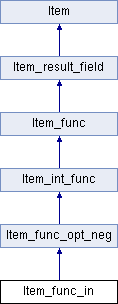|
My Project
|
|
My Project
|

Public Member Functions | |
| Item_func_in (List< Item > &list) | |
| longlong | val_int () |
| bool | fix_fields (THD *, Item **) |
| void | fix_after_pullout (st_select_lex *parent_select, st_select_lex *removed_select) |
| void | fix_length_and_dec () |
| uint | decimal_precision () const |
| void | cleanup () |
| optimize_type | select_optimize () const |
| virtual void | print (String *str, enum_query_type query_type) |
| enum Functype | functype () const |
| const char * | func_name () const |
| bool | nulls_in_row () |
| bool | is_bool_func () |
| const CHARSET_INFO * | compare_collation () |
Public Attributes | |
| in_vector * | array |
| bool | have_null |
| bool | arg_types_compatible |
| Item_result | left_result_type |
| cmp_item * | cmp_items [6] |
| DTCollation | cmp_collation |
| void Item_func_in::fix_after_pullout | ( | st_select_lex * | parent_select, |
| st_select_lex * | removed_select | ||
| ) | [virtual] |
Fix after tables have been moved from one select_lex level to the parent level, e.g by semijoin conversion. Basically re-calculate all attributes dependent on the tables.
| parent_select | select_lex that tables are moved to. |
| removed_select | select_lex that tables are moved away from, child of parent_select. |
Reimplemented from Item_func.
| bool Item_func_in::fix_fields | ( | THD * | thd, |
| Item ** | ref | ||
| ) | [virtual] |
Perform context analysis of an IN item tree.
This function performs context analysis (name resolution) and calculates various attributes of the item tree with Item_func_in as its root. The function saves in ref the pointer to the item or to a newly created item that is considered as a replacement for the original one.
| thd | reference to the global context of the query thread |
| ref | pointer to Item* variable where pointer to resulting "fixed" item is to be assigned |
T0(e IN(e1,...,en)) = union(T1(e),intersection(T1(ei)))
T1(e IN(e1,...,en)) = union(T1(e),intersection(T1(ei)))
T0(e NOT IN(e1,...,en)) = union(T1(e),union(T1(ei)))
T1(e NOT IN(e1,...,en)) = union(T1(e),intersection(T1(ei)))
| 0 | ok |
| 1 | got error |
Reimplemented from Item_func.
| void Item_func_in::print | ( | String * | str, |
| enum_query_type | query_type | ||
| ) | [virtual] |
This method is used for to:
For more information about view definition query, INFORMATION_SCHEMA query and why they should be generated from the Item-tree,
Reimplemented from Item_func.
 1.7.6.1
1.7.6.1